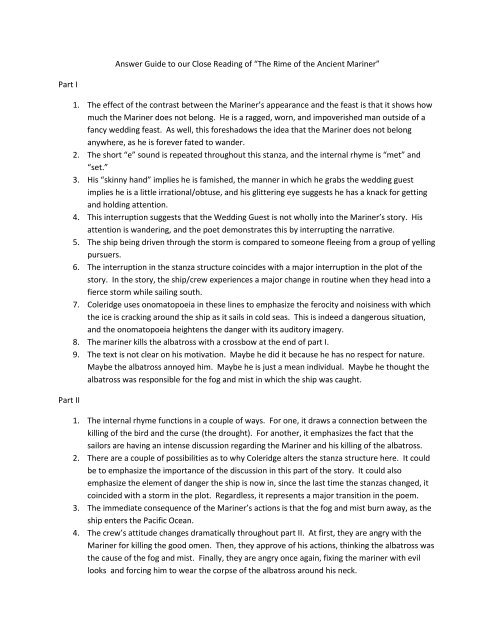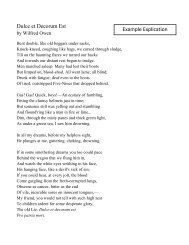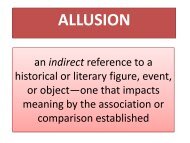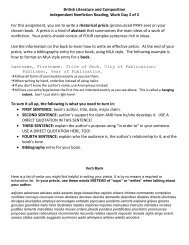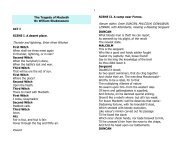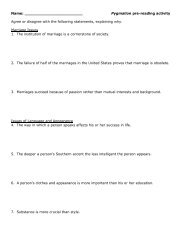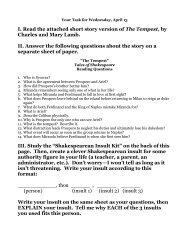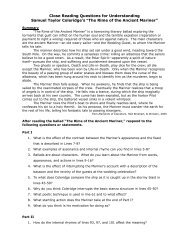Answer Guide to our Close Reading of “The Rime of the Ancient ...
Answer Guide to our Close Reading of “The Rime of the Ancient ...
Answer Guide to our Close Reading of “The Rime of the Ancient ...
Create successful ePaper yourself
Turn your PDF publications into a flip-book with our unique Google optimized e-Paper software.
Part I<br />
Part II<br />
<strong>Answer</strong> <strong>Guide</strong> <strong>to</strong> <strong>our</strong> <strong>Close</strong> <strong>Reading</strong> <strong>of</strong> <strong>“The</strong> <strong>Rime</strong> <strong>of</strong> <strong>the</strong> <strong>Ancient</strong> Mariner”<br />
1. The effect <strong>of</strong> <strong>the</strong> contrast between <strong>the</strong> Mariner’s appearance and <strong>the</strong> feast is that it shows how<br />
much <strong>the</strong> Mariner does not belong. He is a ragged, worn, and impoverished man outside <strong>of</strong> a<br />
fancy wedding feast. As well, this foreshadows <strong>the</strong> idea that <strong>the</strong> Mariner does not belong<br />
anywhere, as he is forever fated <strong>to</strong> wander.<br />
2. The short “e” sound is repeated throughout this stanza, and <strong>the</strong> internal rhyme is “met” and<br />
“set.”<br />
3. His “skinny hand” implies he is famished, <strong>the</strong> manner in which he grabs <strong>the</strong> wedding guest<br />
implies he is a little irrational/obtuse, and his glittering eye suggests he has a knack for getting<br />
and holding attention.<br />
4. This interruption suggests that <strong>the</strong> Wedding Guest is not wholly in<strong>to</strong> <strong>the</strong> Mariner’s s<strong>to</strong>ry. His<br />
attention is wandering, and <strong>the</strong> poet demonstrates this by interrupting <strong>the</strong> narrative.<br />
5. The ship being driven through <strong>the</strong> s<strong>to</strong>rm is compared <strong>to</strong> someone fleeing from a group <strong>of</strong> yelling<br />
pursuers.<br />
6. The interruption in <strong>the</strong> stanza structure coincides with a major interruption in <strong>the</strong> plot <strong>of</strong> <strong>the</strong><br />
s<strong>to</strong>ry. In <strong>the</strong> s<strong>to</strong>ry, <strong>the</strong> ship/crew experiences a major change in routine when <strong>the</strong>y head in<strong>to</strong> a<br />
fierce s<strong>to</strong>rm while sailing south.<br />
7. Coleridge uses onoma<strong>to</strong>poeia in <strong>the</strong>se lines <strong>to</strong> emphasize <strong>the</strong> ferocity and noisiness with which<br />
<strong>the</strong> ice is cracking around <strong>the</strong> ship as it sails in cold seas. This is indeed a dangerous situation,<br />
and <strong>the</strong> onoma<strong>to</strong>poeia heightens <strong>the</strong> danger with its audi<strong>to</strong>ry imagery.<br />
8. The mariner kills <strong>the</strong> albatross with a crossbow at <strong>the</strong> end <strong>of</strong> part I.<br />
9. The text is not clear on his motivation. Maybe he did it because he has no respect for nature.<br />
Maybe <strong>the</strong> albatross annoyed him. Maybe he is just a mean individual. Maybe he thought <strong>the</strong><br />
albatross was responsible for <strong>the</strong> fog and mist in which <strong>the</strong> ship was caught.<br />
1. The internal rhyme functions in a couple <strong>of</strong> ways. For one, it draws a connection between <strong>the</strong><br />
killing <strong>of</strong> <strong>the</strong> bird and <strong>the</strong> curse (<strong>the</strong> drought). For ano<strong>the</strong>r, it emphasizes <strong>the</strong> fact that <strong>the</strong><br />
sailors are having an intense discussion regarding <strong>the</strong> Mariner and his killing <strong>of</strong> <strong>the</strong> albatross.<br />
2. There are a couple <strong>of</strong> possibilities as <strong>to</strong> why Coleridge alters <strong>the</strong> stanza structure here. It could<br />
be <strong>to</strong> emphasize <strong>the</strong> importance <strong>of</strong> <strong>the</strong> discussion in this part <strong>of</strong> <strong>the</strong> s<strong>to</strong>ry. It could also<br />
emphasize <strong>the</strong> element <strong>of</strong> danger <strong>the</strong> ship is now in, since <strong>the</strong> last time <strong>the</strong> stanzas changed, it<br />
coincided with a s<strong>to</strong>rm in <strong>the</strong> plot. Regardless, it represents a major transition in <strong>the</strong> poem.<br />
3. The immediate consequence <strong>of</strong> <strong>the</strong> Mariner’s actions is that <strong>the</strong> fog and mist burn away, as <strong>the</strong><br />
ship enters <strong>the</strong> Pacific Ocean.<br />
4. The crew’s attitude changes dramatically throughout part II. At first, <strong>the</strong>y are angry with <strong>the</strong><br />
Mariner for killing <strong>the</strong> good omen. Then, <strong>the</strong>y approve <strong>of</strong> his actions, thinking <strong>the</strong> albatross was<br />
<strong>the</strong> cause <strong>of</strong> <strong>the</strong> fog and mist. Finally, <strong>the</strong>y are angry once again, fixing <strong>the</strong> mariner with evil<br />
looks and forcing him <strong>to</strong> wear <strong>the</strong> corpse <strong>of</strong> <strong>the</strong> albatross around his neck.
Part III<br />
Part IV<br />
Part V<br />
Part VI<br />
1. The simile here is comparing <strong>the</strong> souls flying from <strong>the</strong> sailors’ bodies <strong>to</strong> <strong>the</strong> whizzing <strong>of</strong> <strong>the</strong><br />
Mariner’s crossbow bolts. It is significant for two reasons: one, it suggests <strong>the</strong> souls <strong>of</strong> <strong>the</strong> men<br />
are angry—it’s almost like <strong>the</strong>y are taking a shot at him as <strong>the</strong>y move on. Second, it suggests<br />
that Death is working quickly, just as <strong>the</strong> Mariner’s curse is.<br />
1. The Wedding Guest is afraid that <strong>the</strong> Mariner is a ghost himself and interrupts <strong>the</strong> Mariner<br />
because <strong>of</strong> this. His suspicions are warranted, since <strong>the</strong> Mariner is haggard looking, and he did<br />
have a harrowing experience with curses and Death.<br />
2. The alliteration and <strong>the</strong> assonance almost leng<strong>the</strong>n <strong>the</strong> words <strong>the</strong>mselves. The long “o” sound<br />
takes time <strong>to</strong> produce, and it just goes <strong>to</strong> exaggerate both <strong>the</strong> length <strong>of</strong> time <strong>the</strong> Mariner was<br />
alone, and <strong>the</strong> intensity <strong>of</strong> his lonely feelings.<br />
3. Coleridge plays on <strong>the</strong> lack <strong>of</strong> pity for <strong>the</strong> Mariner. If not even <strong>the</strong> Saints will pity him, who else<br />
will? Perhaps he is doomed <strong>to</strong> roam <strong>the</strong> Earth forever without a friend in <strong>the</strong> world.<br />
4. The supernatural makes use <strong>of</strong> <strong>the</strong> natural in <strong>the</strong>se lines. The polar spirit freezes <strong>the</strong> corpses in<br />
time, so <strong>the</strong>y do not exude fluids, do not stink, and do not rot. The effect is a harrowing sight<br />
for <strong>the</strong> Mariner, and <strong>the</strong> beginning <strong>of</strong> <strong>the</strong> curse.<br />
5. The stare <strong>of</strong> <strong>the</strong> dead men is a curse on <strong>the</strong> Mariner since he most likely feels he is being stared<br />
at by conscious beings. Their stares are probably accusa<strong>to</strong>ry, and he probably feels<br />
overwhelming guilt.<br />
6. The spell is broken when <strong>the</strong> Mariner seas <strong>the</strong> sea snakes and recognizes <strong>the</strong>ir beauty, thus<br />
acknowledging <strong>the</strong> beauty <strong>of</strong> nature.<br />
1. The metaphorical meaning <strong>of</strong> <strong>the</strong> breaking <strong>of</strong> <strong>the</strong> drought is that it represents <strong>the</strong> end <strong>of</strong> <strong>the</strong><br />
Mariner’s curse, and it represents life, since he has been thirsting <strong>to</strong> death since <strong>the</strong> albatross<br />
was killed.<br />
2. The allusion is a reference <strong>to</strong> Jesus. It is significant because Jesus and <strong>the</strong> Mariner both suffer,<br />
and <strong>the</strong> Mariner is about <strong>to</strong> embark on a j<strong>our</strong>ney <strong>of</strong> repentance like o<strong>the</strong>r Christians. As well,<br />
<strong>the</strong> spirit who utters this phrase uses it as an expression <strong>of</strong> surprise, kind <strong>of</strong> like when we say<br />
OMG about something.<br />
1. The Mariner probably doubts what he sees because so much <strong>of</strong> his experiences lately have been<br />
unbelievable. He has also been dreaming vibrantly, and with all <strong>the</strong> disaster he has<br />
encountered, he’s afraid this is just ano<strong>the</strong>r dream.
Part VII<br />
1. Telling his tale brings <strong>the</strong> Mariner peace. If he does not tell it, his heart begins <strong>to</strong> burn in agony.<br />
His penance is <strong>to</strong> travel around and share his tale.<br />
2. The <strong>the</strong>me <strong>of</strong> <strong>the</strong> poem is that one should love and revere not only one’s fellow humanity, but<br />
also <strong>the</strong> natural world, for God made both, and God loves both.<br />
3. This is an opinion question. It can certainly be relevant in two contexts. One: it seems <strong>the</strong>re is<br />
much selfishness and conflict in <strong>our</strong> world, and it would perhaps be better <strong>of</strong>f if people were<br />
more caring. Second, it is imperative <strong>to</strong> preserve <strong>our</strong> natural world, not only <strong>to</strong> leave its natural<br />
wonders <strong>to</strong> future generations, but also <strong>to</strong> keep it clean for <strong>our</strong> benefit and o<strong>the</strong>r living<br />
creatures’ benefit.<br />
4. The Wedding Guest, after hearing <strong>the</strong> mariner’s tale, is left speechless and stunned. He goes <strong>of</strong>f<br />
<strong>to</strong> <strong>the</strong> feast, but wakes up <strong>the</strong> next day a sadder, but wiser man.


